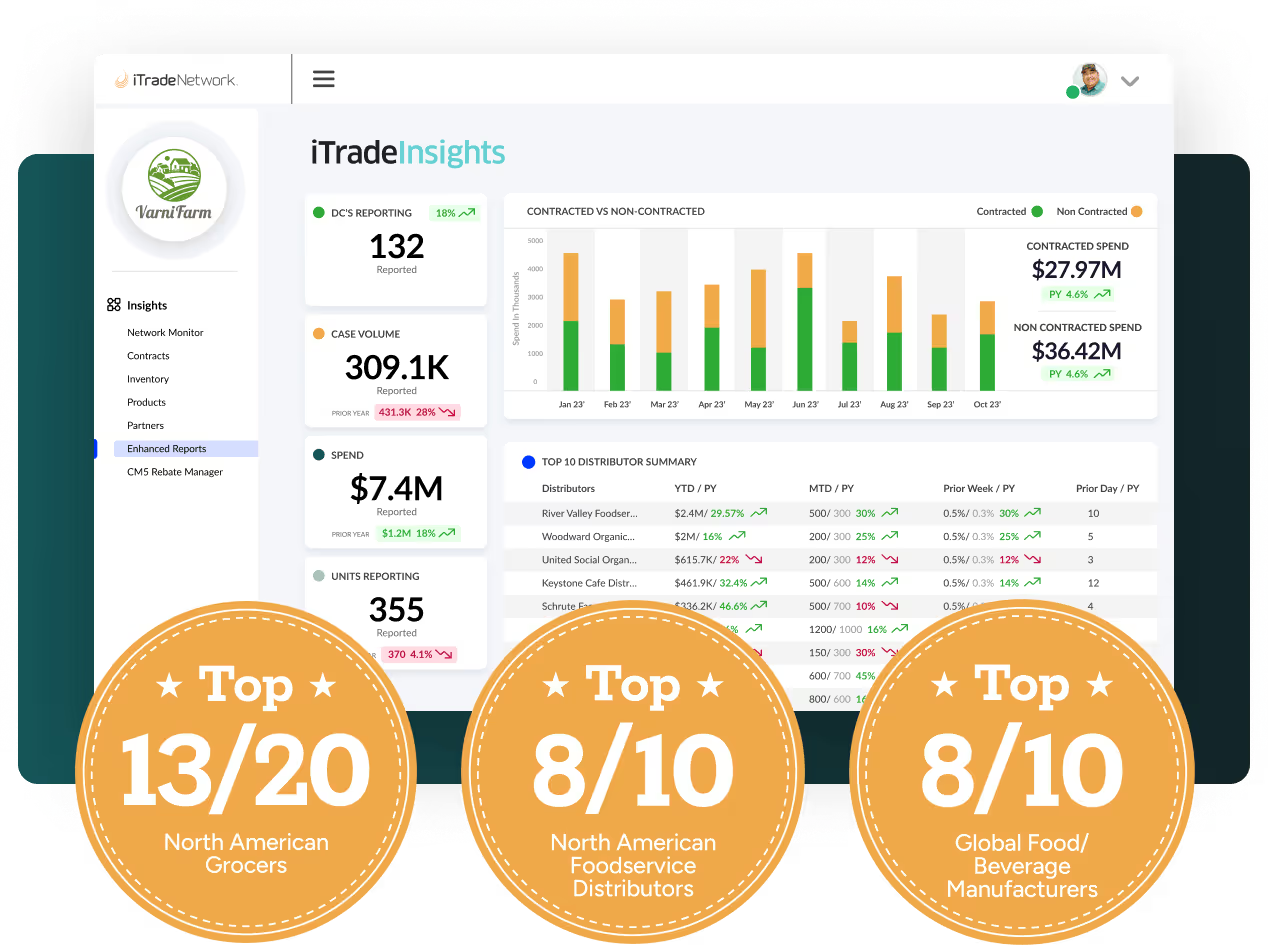Taming Deduction Chaos: Key Takeaways from the IFMA + iTradeNetwork Webinar

Outdated claims processes. Fragmented data. Revenue leakage. These were the big themes of IFMA’s recent webinar featuring iTradeNetwork, where we unpacked how foodservice manufacturers are rethinking trade spend management with automation, AI, and master data discipline.
If you missed the live session, you can catch the full conversation here:
Why Claims and Data Complexity Are Holding Manufacturers Back
The webinar opened with a candid look at the challenges food manufacturers face every day:
- Data chaos: Claims data flows in from distributors, GPOs, redistributors, and operators, often as PDFs, spreadsheets, and even images. With no universal format, teams spend hours trying to reconcile mismatched inputs.
- Margin erosion: Invalid deductions, inaccurate accruals, and “double dips” (when multiple parties claim the same case) chip away at already thin margins.
- Operational strain: Finance, sales, and IT all touch trade programs, but without a single source of truth, each team is left firefighting in silos.
One theme came through loud and clear: without clean, standardized data, it’s nearly impossible to get a handle on program performance.
The Data Enrichment Framework: From Intake to Insights
iTradeNetwork introduced a simple but powerful methodology for turning complex transactional data into financial opportunity:
Intake → Validate → Standardize → Enrich → Analyze
Instead of throwing bodies at messy claims data, this structured process uses technology to:
- Ingest claims in any format (EDI, PDFs, images, spreadsheets)
- Validate against contract terms to catch discrepancies early
- Standardize and harmonize data into a single view
- Flag anomalies and double dips automatically
- Feed back insights to both sales and finance in real time
The result? Teams spend less time chasing paperwork and more time preventing revenue leakage.
The AI Moment: From Reactive to Proactive
A highlight of the session was the shift from traditional machine learning to what’s now called agentic AI.
- Old approach: Predictive analytics flagged issues, but still required humans to investigate and act.
- New approach: Agentic AI doesn’t just suggest, it takes action. Bots can reconcile claims, clear exceptions, and surface only the items needing human judgment.
That means deductions don’t pile up in the backlog. Instead, AI clears the bulk of valid claims instantly and alerts teams only when something looks off.
Tackling the Ultimate Pitfall: Double Dips
One of the most common (and costly) problems discussed was double dips, where multiple parties claim trade funds for the same product movement. These often occur when operators switch GPOs or when contract dating isn’t tracked consistently.
AI and master data alignment can:
- Detect overlapping claims in real time
- Flag mismatched GPO affiliations and effective dates
- Automate clawbacks or short-pays when overpayment is detected
For finance and sales teams, this means greater confidence that negotiated programs are executed as intended and that margins aren’t quietly eroded.
Why Master Data Is the Backbone
If AI is the engine, master data is the fuel. No level of automation works without accurate, up-to-date records of:
- Customer hierarchies (parent/child relationships, GPO affiliations, redistributor networks)
- Product data (SKUs, pack sizes, pricing)
- Effective dating for contracts and programs
When this foundation is in place, AI can map claims back to reality, giving leaders visibility into whether anticipated volume growth matches actual performance.
Watch On-Demand
The full webinar is packed with examples, dashboards, and practical steps to modernize trade spend workflows. Whether you’re in finance, sales, or supply chain leadership, it’s worth the replay.
Bottom line: Trade spend doesn’t have to be chaotic. With AI and master data working together, manufacturers can finally stop revenue leakage, resolve claims faster, and strengthen partnerships across the supply chain. Learn more.
Speak to an Expert
Take a closer look at the platform built for buyers and their trading partners

Taming Deduction Chaos: Key Takeaways from the IFMA + iTradeNetwork Webinar
Outdated claims processes. Fragmented data. Revenue leakage. These were the big themes of IFMA’s recent webinar featuring iTradeNetwork, where we unpacked how foodservice manufacturers are rethinking trade spend management with automation, AI, and master data discipline.
If you missed the live session, you can catch the full conversation here:
Why Claims and Data Complexity Are Holding Manufacturers Back
The webinar opened with a candid look at the challenges food manufacturers face every day:
- Data chaos: Claims data flows in from distributors, GPOs, redistributors, and operators, often as PDFs, spreadsheets, and even images. With no universal format, teams spend hours trying to reconcile mismatched inputs.
- Margin erosion: Invalid deductions, inaccurate accruals, and “double dips” (when multiple parties claim the same case) chip away at already thin margins.
- Operational strain: Finance, sales, and IT all touch trade programs, but without a single source of truth, each team is left firefighting in silos.
One theme came through loud and clear: without clean, standardized data, it’s nearly impossible to get a handle on program performance.
The Data Enrichment Framework: From Intake to Insights
iTradeNetwork introduced a simple but powerful methodology for turning complex transactional data into financial opportunity:
Intake → Validate → Standardize → Enrich → Analyze
Instead of throwing bodies at messy claims data, this structured process uses technology to:
- Ingest claims in any format (EDI, PDFs, images, spreadsheets)
- Validate against contract terms to catch discrepancies early
- Standardize and harmonize data into a single view
- Flag anomalies and double dips automatically
- Feed back insights to both sales and finance in real time
The result? Teams spend less time chasing paperwork and more time preventing revenue leakage.
The AI Moment: From Reactive to Proactive
A highlight of the session was the shift from traditional machine learning to what’s now called agentic AI.
- Old approach: Predictive analytics flagged issues, but still required humans to investigate and act.
- New approach: Agentic AI doesn’t just suggest, it takes action. Bots can reconcile claims, clear exceptions, and surface only the items needing human judgment.
That means deductions don’t pile up in the backlog. Instead, AI clears the bulk of valid claims instantly and alerts teams only when something looks off.
Tackling the Ultimate Pitfall: Double Dips
One of the most common (and costly) problems discussed was double dips, where multiple parties claim trade funds for the same product movement. These often occur when operators switch GPOs or when contract dating isn’t tracked consistently.
AI and master data alignment can:
- Detect overlapping claims in real time
- Flag mismatched GPO affiliations and effective dates
- Automate clawbacks or short-pays when overpayment is detected
For finance and sales teams, this means greater confidence that negotiated programs are executed as intended and that margins aren’t quietly eroded.
Why Master Data Is the Backbone
If AI is the engine, master data is the fuel. No level of automation works without accurate, up-to-date records of:
- Customer hierarchies (parent/child relationships, GPO affiliations, redistributor networks)
- Product data (SKUs, pack sizes, pricing)
- Effective dating for contracts and programs
When this foundation is in place, AI can map claims back to reality, giving leaders visibility into whether anticipated volume growth matches actual performance.
Watch On-Demand
The full webinar is packed with examples, dashboards, and practical steps to modernize trade spend workflows. Whether you’re in finance, sales, or supply chain leadership, it’s worth the replay.
Bottom line: Trade spend doesn’t have to be chaotic. With AI and master data working together, manufacturers can finally stop revenue leakage, resolve claims faster, and strengthen partnerships across the supply chain. Learn more.
Unlock It Now!


